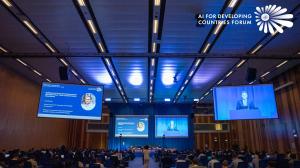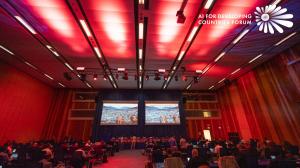Historic AI Investment Framework Unveiled at AIFOD Summit in UN Vienna

Juraj Hostak, Director of Innovation at Slovakia's Ministry of Investment, presents "Building the Financial Infrastructure: Slovakia's Real-Time AI Governance Experience" , demonstrating how smaller nations can lead AI policy innovation through adaptive frameworks.
600 delegates from 120+ countries forge "FAIR Framework" on cooperative AI development, challenging tech giants' dominance.
NY, UNITED STATES, July 31, 2025 /EINPresswire.com/ --
In a dramatic three-day gathering that could reshape the global AI landscape, the AI for Developing Countries Forum (AIFOD) hosted an unprecedented summit at the United Nations Office at Vienna, producing what delegates are calling a "revolutionary framework" for AI investment that could unlock $1.2 trillion in economic opportunities for developing nations.
The independent international organization brought together 600 delegates from over 120 countries who packed the UN conference halls not to accept the current status quo, but to rewrite it entirely. The numbers tell a stark story: while developed nations invested hundreds of billions in AI development in 2025, the entire Global South received less than 1% of global AI funding.
The gathering's most concrete achievement was the Vienna Conference Consensus, a historic agreement that establishes the FAIR (Future AI Investment Responsibility) framework - a comprehensive guide that moves beyond traditional economic metrics to include community impact and cultural preservation in AI investment decisions.
The urgency driving the AIFOD summit became clear through compelling economic projections presented during the opening sessions at the UN venue. A "do nothing" scenario projects over half a trillion dollars in annual GDP losses for the Global South, while an "act now" scenario demonstrates that just 10 frontier markets adopting AI could add $1.2 trillion in new GDP by 2035 - equivalent to creating an economy the size of Mexico.
"AI governance is not just technical, it's also political. You need leadership, trust and coordination," explained Juraj Hostak, Director of Innovation at Slovakia's Ministry of Investment, whose country's experience with adaptive AI governance provided a roadmap for other nations. "No single country can solve the AI divide alone."
Jason Slater, Chief AI and Innovation Digital Officer at UNIDO, emphasized how international organizations are repositioning to support this transformation. "We believe that AI and digital technologies can help small and medium enterprises access private sector opportunities," Slater said, highlighting concrete examples from leather producers and agricultural sectors where AI applications are already demonstrating measurable impact.
The economic stakes became tangible through specific examples presented during blended finance sessions. Off-grid solar programs leveraging hundreds of millions in public grants to attract massive private investment, large-scale renewable energy projects channeling substantial private funding through strategic public partnerships, and rural technology programs demonstrating how initial investments can create massive waves of follow-on investment.
Brian Poe Llamanzares, Congressman and President of the AI Global Governance Council, framed the central challenge facing policymakers: "How can public funds strategically de-risk private investments in AI infrastructure? Can we create financial vehicles that align development values with profitable returns?"
Laurent Lacroix, Chief Data Officer at INTERPOL, brought the perspective of international law enforcement to discussions about neutral facilitation in AI governance. "This historic venue reminds us that the challenges we face require multilateral solutions," Lacroix noted, emphasizing how AI governance decisions made in developing countries have global implications for security and cooperation.
Perhaps most provocatively, the AIFOD summit challenged the fundamental assumption that developing countries must be technology recipients rather than creators. Delegates heard compelling evidence that AI markets in developed countries are approaching saturation while developing markets experience explosive growth rates exceeding 25% annually in multiple regions.
The AIFOD summit's answer came through validated models from successful real-world implementations. Government representatives demonstrated effective public-private partnerships that maintain sovereignty over critical digital infrastructure. Officials showed how smaller nations can become AI policy leaders through adaptive governance. Multiple developing country representatives presented evidence of grassroots AI applications delivering immediate community benefits without requiring expensive infrastructure.
Richard Malcolm Simbil, Counsel to the Ombudsman Commission of Papua New Guinea, provided perspective on the governance challenges facing smaller nations attempting digital transformation across diverse populations. Speaking about efforts to serve 10.6 million people across thousands of islands, Simbil emphasized that effective AI governance requires building trust and ensuring systems serve local rather than external priorities.
The AIFOD summit's three-day structure traced a deliberate arc from diagnosis through solution-building to implementation. Day one confronted "AI's Unequal Future" with brutal honesty about current disparities. Day two focused on "Bridging the Funding Gap" through innovative financing mechanisms and public-private partnerships. Day three explored "The Third Path" of cooperative frameworks that transcend traditional either-or choices.
But perhaps more significant than any single framework was the summit's central revelation: that developing nations don't need to choose between technological dependency and isolation. Instead, the "third path" of cooperative sovereignty emerged as delegates demonstrated how strategic collaboration can strengthen rather than compromise national autonomy.
The summit concluded with the appointment of five Senior Fellows who will guide AIFOD's strategic direction: Olivier Grenet, Head Research Quality and AI ambassador at Novartis; Susana Falcão, Executive Director of Fondation Ondjyla; Carine Allaz, CEO and cybersecurity expert at CIRISK; Lorenzo Larini, CEO of MINT; and Derrick T Davis, Director at University of Maryland Baltimore County.
As delegates departed the UN headquarters, many carried specific commitments for follow-up collaborations based on frameworks developed during the intensive sessions. The AIFOD summit's emphasis on practical cooperation over theoretical debates appears to have generated momentum that could extend far beyond Vienna.
The Vienna Consensus establishes that "small countries are a driving force for a fair, respectful, accessible and sustainable use and development of AI" while committing to put "human beings at the center of our ideas and actions." Whether this ambitious vision can reshape global AI development remains to be seen, but the 600 delegates who spent three days at the UN crafting cooperative frameworks clearly believe the transformation has already begun.
The message from Vienna is unmistakable: the Global South is no longer waiting for permission to participate in the AI revolution. Through AIFOD's independent platform and the United Nations' convening power, it's building the investment frameworks to lead it.
Dawid Wiktor
Media Scope Group
email us here
Legal Disclaimer:
EIN Presswire provides this news content "as is" without warranty of any kind. We do not accept any responsibility or liability for the accuracy, content, images, videos, licenses, completeness, legality, or reliability of the information contained in this article. If you have any complaints or copyright issues related to this article, kindly contact the author above.


